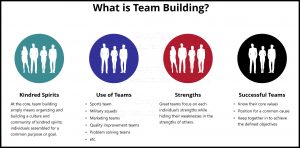Team Building
Many managers and employees are prone to view anything labeled as a team building exercise with skepticism. But the truth is that team building exercises do wonders for workplace culture and collaboration. They also help workers develop interpersonal skills that can be utilized when working on actual projects and assignments.
When a company employs a certain set of values, behaviors and norms for its workforce, it establishes a foundation for collaboration. Teams can work together more productively and effectively in such environments, as long as they know how to navigate challenges that may arise. Team building is a way to promote these ideals and teach team members how to collaborate, communicate and work through difficult moments.
Teambuilding can happen internally or externally. Internally, it can be as simple as regular meet-ups and allowing workers to communicate with one another during everyday working hours. But this type of team building is often unmonitored, and it can lack the positive effects that more structured events and workshops can have on a team’s dynamic and productivity.

What Do You Mean by Team Building?
Most of the time, teambuilding takes place during a workshop or event held by management or HR. These events are usually structured and guided by professionals who specialize in teamwork and organizational dynamics. They can range from fun-focused teambuilding, to more specific workshops that focus on critical thinking, decision-making and collaboration.
Ultimately, the goal of most teambuilding activities is to encourage a group of people to trust and support each other. This is because the ability to trust and cooperate with others is one of the most important aspects of successful collaboration in any workplace. Without it, project workflows grind to a halt, and productivity suffers significantly.
Even if your project team is made up of the most talented individuals in your industry, it will still struggle to produce results if there is no trust. If colleagues are suspicious of each other’s motives and envious of each other’s accomplishments, they won’t want to contribute their own ideas or skills for the good of the group. That’s why it’s so important to invest in teambuilding, regardless of the size of your organization or whether or not you have a physical office space.
Teambuilding is crucial for companies that value creativity, innovation and job satisfaction. It enables better team collaboration, streamlines decision-making and boosts employee morale. Neglect it at your own peril! In today’s remote working landscape, a strong sense of connection is even more important.